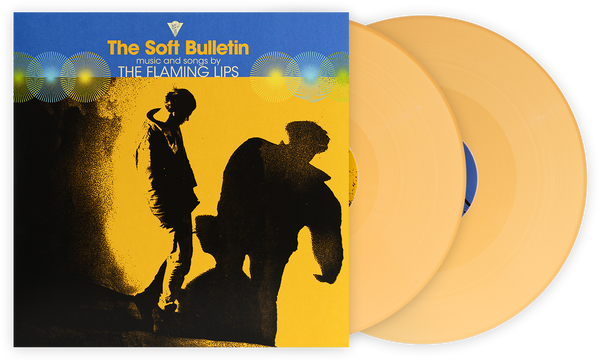The Sound They Made Was Love: 20 Years of ‘The Soft Bulletin’
We Talk To Wayne Coyne In Celebration Of The Anniversary Of His Band’s Masterpiece
The Flaming Lips’ The Soft Bulletin, released in May or June 1999, depending on which side of the Atlantic you were on, is an album about many things — the passage of time, the meaning of love, the importance of human connection and, ultimately, how the looming presence of death intensifies experience. It seemed to look backward and forward simultaneously. The orchestral production and grand sweep brought comparisons to song cycles from decades earlier, like the Beach Boys’ Pet Sounds and Pink Floyd’s Dark Side of the Moon, but The Soft Bulletin also felt like the future, the right album to bring the decade to a close. Those who heard it then remember how startling it sounded on that first play but its dazzling sonics became a comfort, and everyone who has connected with The Soft Bulletin since has carried part of it with them.
Twenty-year anniversaries are the best album anniversaries — long enough to say the album truly comes from another world, but not so long ago that this particular world is entirely unfamiliar. By some measures, 20 years is the length of a generation, enough time to reflect on those around you who were born and grew up and grew old and those who might not be around anymore.
One way to understand why The Soft Bulletin has endured is to go back to the anxious period it emerged from. By the mid-1990s, The Flaming Lips had been playing music together for a long time and they lucked into a certain amount of success when “She Don’t Use Jelly,” from their 1993 album Transmissions from the Satellite Heart, became a whimsical MTV-fueled novelty hit. Their next album, Clouds Taste Metallic, didn’t sell nearly as well, and after a lengthy tour supporting it, they hit a patch of trouble.
Ronald Jones, the brilliant guitarist whose leads and textures had been one of the group’s sonic signatures, left the group; Warner Bros., The Flaming Lips’ label, was in turmoil following reorganization and some of the band’s initial champions departed; Steven Drozd, the superstar drummer, had a growing drug problem. And bandleader Wayne Coyne’s father was diagnosed with cancer in October 1996 and then died three months later.
During this tense period, when The Flaming Lips weren’t sure what would come next, Coyne, Drozd, and bassist Michael Ivins experimented. Working informally in Oklahoma City, they began filling cassette tapes with strange music — fragments of songs, sound effects, drones — and constructed events in parking garages where the tapes would be played in car stereos of a few dozen volunteers and then the concrete structure would be transformed into a collective art installation. Out of these happenings, they began to develop an idea of what the next phase of The Flaming Lips might sound like. Absent Jones’ irreplaceable guitar, they would think in terms of arrangements, shifting the focus of their songs to keyboards, strings, and horns.
Speaking to Coyne via telephone from his home in Oklahoma City, he remembers the turmoil of the moment and also plays it down. Yes, it was a precarious time for everyone involved, but nothing they had done to that point was easy. “In the beginning, I’m writing about this aftermath of my father — songs about his illness, and then about his death,” he tells me. “But at the time, I’m not thinking that I was writing about that, because these things happen to everybody.”
The songs on The Soft Bulletin cluster around a handful of thematic centers — love, death, consciousness, physics — which spread out like a neural web or a subway map or a constellation. It’s impossible to travel to any one idea without touching on others along the way. So the opening “Race for the Prize,” which begins with that unforgettable drum crash, piano run, and string sounds that seem to balloon outward from the explosion of the percussion, seems at first like the kind of lighthearted fantasy the band had made their name with earlier — “Lightning Strikes the Postman,” say. We could view it as a cartoon, but inside of the whimsy looms something serious. The “cure for all mankind” Coyne imagines would presumably begin with the cure of a single patient, and anyone who has spent too much time in hospital can tell you how the mind works when confronted with a terminal diagnosis for someone you care about: Can’t anybody do something? All this technology can’t fix it?
“Waiting for Superman” takes a similar idea and stretches it wider. The one thing we’ve always thought would save us is gone, and all we’re left with is each other. It’s a terrifying realization at first, but then it becomes hopeful. The force that binds us together — love — is, The Soft Bulletin argues, the most powerful we could ever know. Those who experience it can do things beyond their imagination, like, say, lifting the sun into the sky.
But for all its power, there’s one thing love can’t stop, and the anguished burn of this realization is the fuel that propels The Soft Bulletin. “Life without death is just impossible,” goes the line in “Feeling Yourself Disintegrate,” the song that embodies the album’s deepest ideals. Coyne tells me that this is the crux. “This quagmire of giving yourself absolutely to love — of your life, the world, the people around you, giving as much as you can, knowing it will all go away, it will all be destroyed, I think somewhere in there is what The Soft Bulletin is about,” he says. Every moment of joy on the album — and there are a lot of them — is pregnant with the knowledge that it could all end in an instant.
So we need to notice when things are good, because that feeling won’t be there forever. The insects swarming around our heads in “Buggin’” might on a given day be annoying but when we’re focusing on the whole sweep of our existence they become beautiful, because it’s now and we’re here and we have someone to appreciate it with. The same goes for “Slow Motion,” which suggests that bringing awareness to easy bliss can decelerate time, giving us a longer “now” to wallow in.
The Soft Bulletin finds truth in opposites. The words in “The Spiderbite Song,” move from dreamy togetherness to a terrifying glimpse of the end, and uses that contrast as an argument for savoring every moment. “I was glad that it didn’t destroy you, how sad that would be,” Coyne sings, “Because if it destroyed you, it would destroy me.” “The Spark That Bled (The Softest Bullet Ever Shot)” and “Suddenly Everything Has Changed (Death Anxiety Caused by Moments of Boredom)” also sit at this intersection, where numbing routine meets shocking, unexpected, and irreversible change. We forget this possibility at our peril.
For Coyne, the knowledge of what the album communicated came later. “I don’t think we knew we were saying these things — or that we could say these things,” he says now. Musicians make the music, but they don’t control what happens to it after. Which means that this album’s meaning comes not from The Flaming Lips, but from us. And the fact that it’s about interconnection, and how we exist in a world where we are fragile, and where we need all the help we can get to stay alive, implies that its meaning is always changing, because we’re always changing. “I listen to stories people tell me about what a song from the album meant to them, what crystalized when they heard such-and-such song,” Coyne says. “It’s not the music that’s important. I can look at it now and say it's a great, emotional, fucking weird-ass record, and I'm so glad that we made it. But it's your life intersecting with it, that’s where the meaning is found.”
When The Soft Bulletin came out, I was coming to the end of my 20s, and I could feel a phase of my life ending and didn’t know what was next. This terrified and overwhelmed me, and my persistent anxiety kicked into overdrive and I felt paralyzed and physically sick. During this time, The Soft Bulletin never left my Discman (yes, a portable CD player, see what I mean about albums coming from another world?), I spun it over and over as I walked the city and tried to puzzle through where it all might be going. Things felt far too heavy, and I was in fact waiting for something, but I wasn’t sure what. The music helped, a lot.
And then two decades later, late 2018, and now I’m closing out my 40s, and my father died after a long illness. I felt hollow and confused, confronting the reality of him being gone while also thankful that his suffering was over. And then a day or two later, without thinking about it, I listened to “Feeling Yourself Disintegrate,” and thought about his body at the end, slowing down until it stopped as he left this world. And the music helped again.
Then I thought about how, even after death, something remains, the part of you that lives with other people, the memories they carry around with them. This, too, is the story of The Soft Bulletin, an album that changed things for The Flaming Lips and their fans. History tells us it came out in 1999, but it exists in a perpetual present. It’s an album you return to and hear differently as your own life moves forward and endings of every kind become all too real, a reminder that this flash of now is all we will ever have.
Mark Richardson is the rock and pop critic for the Wall Street Journal. He was the Editor-in-Chief and Executive Editor of Pitchfork from 2011 to 2018, and has written for publications including the New York Times, NPR, Billboard and The Ringer.
Related Articles
Join the Club!
Join Now, Starting at $44Exclusive 15% Off for Teachers, Students, Military members, Healthcare professionals & First Responders - Get Verified!






